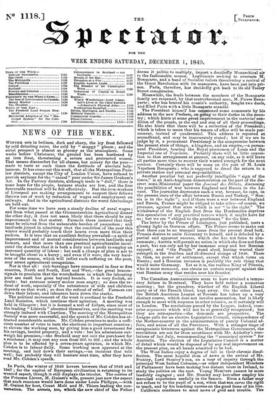In Paris, the winter of 1849 hovers between that of
1848 and 1847; for the capital of European civilization is returning to its wonted aspect, though it still displays the tricolor. The soirees of the Princess Lieven, M. Guizot's wife, present just now the aspect that such reunions would have done under Louis Philippe,—with M. Gnizot for host, Count Mole and M. Thiers leading the con- versation. The arrests, too, which the new chief of the Police
deems it politic to multiply, impart a decidAcify Monarchical air to the fashionable season. Legitimists seeking to overturn N. Bonaparte, and a band of Socialist tailors threatening a revival of the Great Revolution with its massacres, have been put into pri- son. Paris, therefore, has decidedly got back to its old Tooley Street conspiracies.
Meanwhile, the feuds between the members of the Bonaparte family are reopened, by that scatterbrained man, M,Pierre Bona- parte; who has braved his cousin's authority,- fought two duels, and filled Paris with a little Bonaparte scandal. The President himself has occasioned some comments by his address to the new Prefects, 6r t frang to their dutiee in the coun- try; which hints at some great improvement in the material con- dition of the people, as the end and aim of all their proceedings. He also hints that there will be a reelection of the President; which is taken to mean that his tenure of office will be made per- manent, instead of quadrennial. This address is reported at secondhand, and may be inaccurately stated ; but if we are to judge by it, a permanent Presidency is the compromise between the present state of things, a kingdom, and an empire,—a perma- nent President, bearing the Royal przenomen of Louis and the Imperial one of Napoleon. Probably there will be little opposi- tion to that arrangement at present, on any side, as it will leave all parties more time to recover their wasted strength for the next contest. Certainly there will be none on the part of M. Louis Napoleon Bonaparte ; who is supposed to dread the return to a private station and personal responsibilities. Another peculiar but not perfectly intelligible " sign of the times," is an Anti-Anglican demonstration on the part of the dis- creet semi-Ministerial paper the Journal des Debuts, discussing the possibilities of war between England and Russia in the Le- vant. The journalist deprecates such a war, because, he says, in the present state of the affair between Russia and Turkey, " Rus- sia is in the right"; and if there were a war between England and Russia, France might be obliged to take sides—of course, we presume, against that state which is not "in the right." The withdrawal of the English fleet from the Dardanelles deprives this speculation of any practical terrors which it might have for us ; but we are "obliged to the gentleman" for the hint. The letter by the Prince of Leiningen, just published, casts a gloomy light on German affairs. The Prince seems to make out that there can be no tranquil issue from the present dead lock. Prussia desires to unite Germany to herself, and is deluded by a partial and apparent success, which she has not force to con- summate; Austria will permit no union in which she does not form a part, but can only act by her immense army and her Russian support; and "the People" stand aloof, having wasted their strength in the fruitless and ill-directed risings of 1848. There is then, no power of settlement, except that which turns on Russia ; and a Russian invasion is probably the sole thing that would unite Germany. Yet as it is, the restless King of Prussia, who is most menaced, can obtain no certain support against the vast Russian army that resides near his frontier.


























